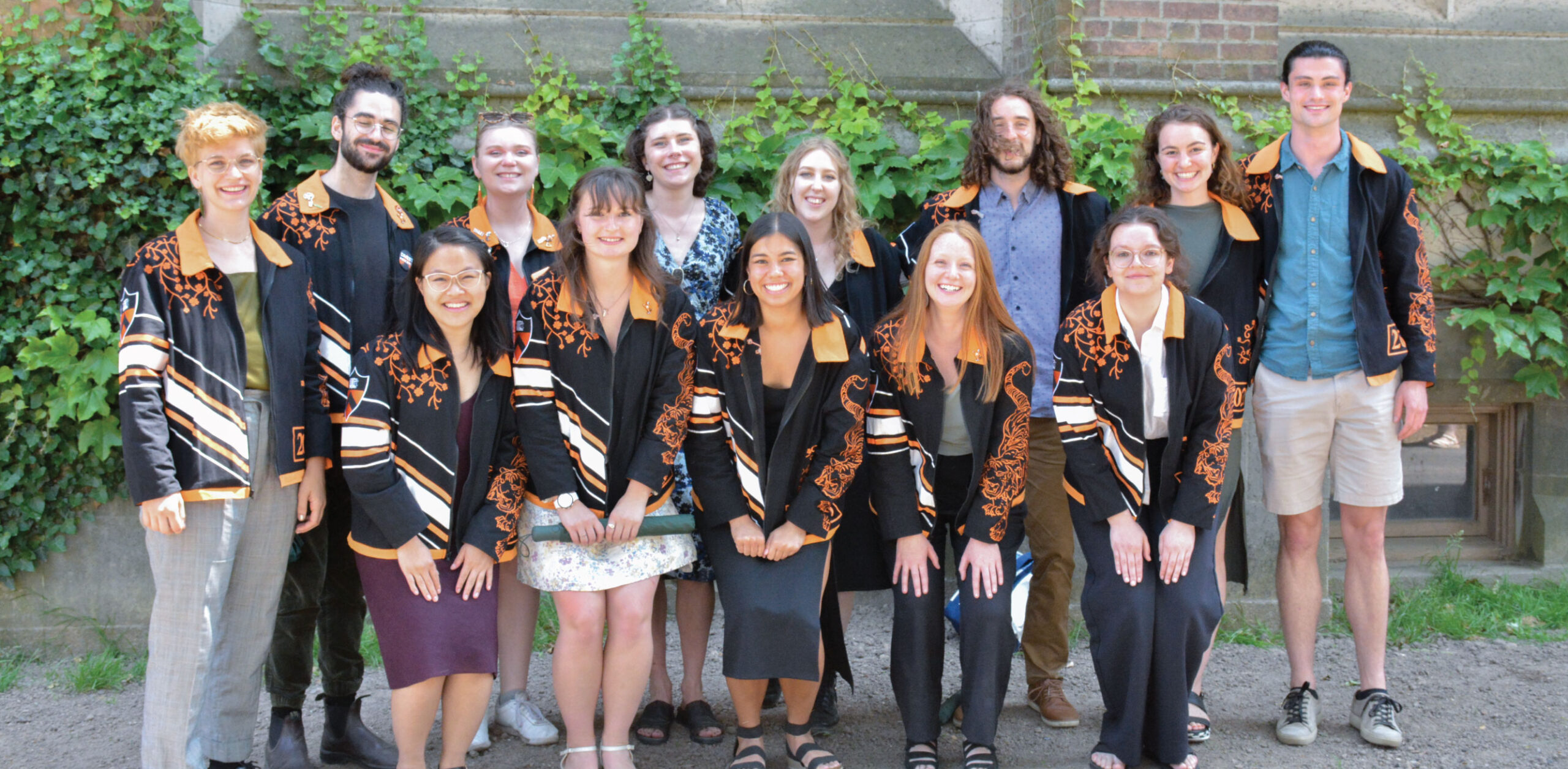Pictured are (from left): Magdalena Poost, Liam Seely, Lois Wu, Julia Elman, Molly Sauter, Annabel Dupont, Marissa Mejia, Faith Moore, Chaya Holch, Stav Bejerano, Isabel Rodrigues, Sarah Brown, and Ben Buchovecky.
(Photos by Mae-Yung Tang, High Meadows Environmental Institute)
ENV Class Day 2023 honors newest graduates of Princeton’s environmental studies program and celebrates their commitment to environmental research
Students and parents joined faculty, researchers and staff from the High Meadows Environmental Institute (HMEI) and the Program in Environmental Studies to celebrate the 42 Princeton University seniors who are the latest recipients of certificates in environmental studies (ENV).
Held May 29, ENV Class Day 2023 recognized students for their exceptional work throughout their four years at Princeton and especially for the quality and interdisciplinary breadth of their senior thesis research.
ENV Program Director Corina Tarnita, professor of ecology and evolutionary biology, recognized the disruption of the COVID-19 pandemic on the class of 2023, and commended them for their resilience.
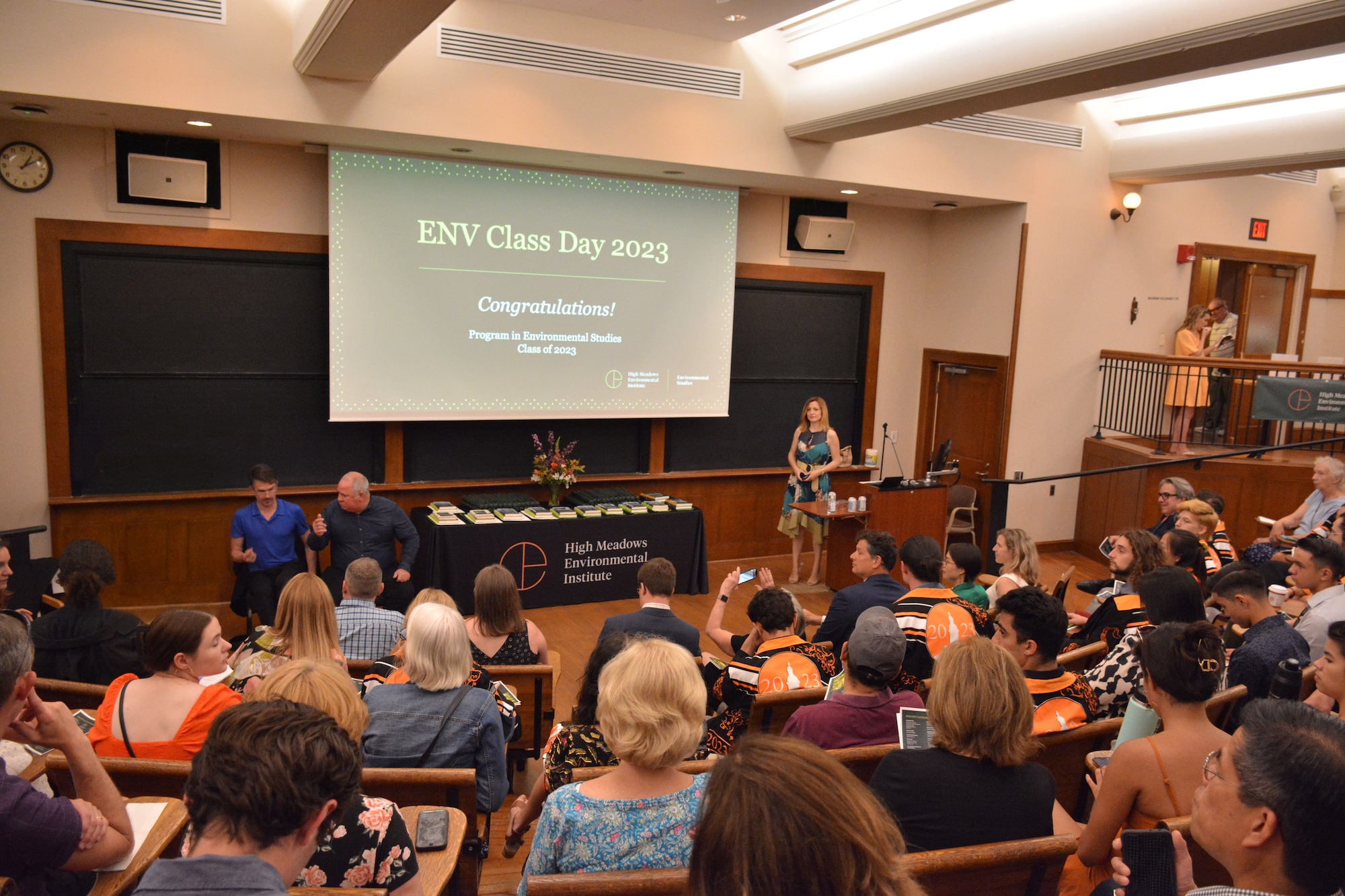

“You were the last ones to experience what normal felt like before the pandemic. and you’re also the ones who really walked us back to normal. I personally am extremely grateful for the resilience that you have shown as well as your commitment to yourselves as a community, to Princeton, and to the amazing work that you have all done.”
“The ENV program started more than 30 years ago, but the ethos of the program has remained the same: to make sure that everyone feels that they are an equal stakeholder in the conversation about urgent environmental issues,” said Tarnita. “And we mean everyone! It takes people from all around the university, from a diversity of backgrounds, each bringing their own expertise to the table to deal with the urgent environmental issues of today. One cannot really have a better metric to measure whether the program has succeeded at doing that than to look at our extraordinary certificate students, and this year we have 42 certificate students from 20 departments across the university who have produced an extraordinary crop of research that was broad, and outstanding, and ambitious.”
After recognizing each certificate recipient, Tarnita presented prizes for particularly outstanding thesis research and for exceptional engagement with environmental studies to twelve seniors. Full descriptions of the prizes are below.
“The environmental challenges that we try to understand and build solutions for are great and they touch all aspects of our lives, but when you have the best minds dedicated to working, and committed to bringing the best understanding, some compassion, and some thorough hard work, we can do great things,” said HMEI Director Gabriel Vecchi, professor of geosciences and the High Meadows Environmental Institute, to close the ceremony
“The dedication that the great class of 2023 has exhibited gives me a lot of hope for what they’re going to do going forward,” said Vecchi. “I want to thank all of you, family and friends of our students, for giving them to us for these four years, so that we’ve been able to spend time with them, to learn from them and learn with them.”


The third annual Henry Horn Prize was presented by Elizabeth Horn, widow of the late Henry Horn, professor of ecology and evolutionary biology, emeritus, and founding director of the Program in Environmental Studies. The prize recognizes the graduating senior in the Certificate Program in Environmental Studies who has produced the best poster presentation of their independent research for a broad audience.
Marissa Mejia in psychology received the prize for her poster presenting findings of her thesis, “The Caged Bird Sings of Freedom: Using Social Norm Psychology to Counter Wild Songbird Trade in Viet Nam.”
Honorable mention went to Isabel Rodrigues, a senior concentrator in geosciences for the poster presentation of her senior thesis, “A Minimally-Invasive, On-Site Identification Method for Lead-Lined Water Service Lines: A Case Study From Trenton, New Jersey.”
Five Environmental Studies Book Prizes were presented to students for exceptional research and demonstrated ability to communicate their work and its significance.
Ashley Cao in civil and environmental engineering received the book prize in Engineering and Applied Science for her investigation of the impacts of climate change on plant communities in the Upper Colorado River Basin, a region that is suffering from unprecedented drought.
Tarnita read comments from Cao’s adviser, Reed Maxwell, professor of civil and environmental engineering and the High Meadows Environmental Institute, who said that Cao’s work “was technically challenging and physically demanding yet the results are stellar.”
“Cao’s research suggests that invasive plants might capitalize on drier climates and outcompete native ones, which has implications for both water resources and tourism.”
Cao also received the Lore Von Jaskowsky Memorial Prize from the School of Engineering and Applied Science.
Molly Sauter in ecology and evolutionary biology received the book prize in Natural Sciences for her work on the immune-epidemiological determinants of seasonal influenza transmission in South Africa. Sauter’s work sheds light on variation in infection patterns between individuals and households in a low-income community.
Tarnita read comments from Sauter’s adviser, Bryan Grenfell, the Kathryn Briger and Sarah Fenton Professor of ecology and evolutionary biology and public affairs, in which he noted that Sauter “did an extremely impressive thesis.”
“The work should lead to several important publications with her South African and NIH collaborators. The thesis is a particularly clear description of a superb analysis deploying advanced statistical methods.
Stav Bejerano in philosophy received the book prize for the Humanities for his work synthesizing resources on Marx, animal rights, and the environment to evaluate whether Marx has anything to offer to ecological analysis today.
In remarks read by Tarnita, Bejerano’s adviser, Anna Stilz, the Laurance S. Rockefeller Professor of Politics and the University Center for Human Values, said that Bejerano’s thesis stood out for its “clarity, rigor of argument, and breadth of coverage.”
“To offer a new analysis of exploitation is alone a coup for an undergraduate thesis; to extend this analysis to animals and the environment is really a stunning achievement. Bejerano handles all this material deftly, clearly, and with a precise analytical touch.”
Magdalena Poost in anthropology received the book prize in Performing and Visual Arts for their thesis production, which integrated approaches in the social sciences, humanities, and the performing and visual arts to connect the anthropology of food culture with environmental justice and ideas of queer community.
Poost’s senior thesis culminated in an immersive installation of original writing, photographs, and other artworks. They also produced a series of participatory meals that explored the complex relationships between food, climate change, memory, and care.
Allison Caruth, professor in the Program in American Studies and High Meadows Environmental Institute, commended Poost on behalf of herself and co-adviser Brian Herrera, associate professor of theater in the Lewis Center for the Arts.
“We’re so proud of the work you did across your anthropology, theater, and creative writing senior projects, and we’re sure you will continue to be a leader and trailblazer in environmental science and the humanities.”
Adam Elkins in the School of Public and International Affairs received the book prize in Social Sciences for his assessment of the impact of land-use planning on the concentration of environmental harms near low-income communities of color. Elkins used Chicago and Houston as case studies to show how land-use planning has historically placed environmental burdens on low-income communities of color, and argued that now, policymakers can and should use zoning and land-use planning as a tool to undo that harm and to fight environmental injustices.
Elkin’s advisor, Nicky Sheats, lecturer of Public and International Affairs, noted that Elkins produced a “clear and insightful analysis of complex social, economic, and environmental issues to engage a question concerning communities that need more research and resources devoted to them.”
Calif Chen in the School of Public and International Affairs received an Environmental Studies Senior Thesis Prize for her work investigating the gap between disadvantaged coastal communities and federal grant programs that aim to help these communities cope with climate change.
Tarnita read comments from Chen’s adviser, Michael Oppenheimer, the Albert G. Milbank professor of geosciences and international affairs in the Princeton School of Public and International Affairs (SPIA), the Department of Geosciences, and the High Meadows Environmental Institute, who said “Chen’s thesis, which addresses a question at the cutting edge of public policy for the environment, is not only original, but also delivers two pieces in one: a qualitative-quantitative one-two punch.”
“I hope Calif brings these same qualities to bear in the next couple of years to carry this work forward; the environmental policy world needs her keen insight.”
Faith Moore in economics also received an Environmental Studies Senior Thesis Prize for her work examining the impact of the El Niño Southern oscillation (ENSO) on renewable energy stock markets. By blending climate science and financial economics, Moore showed that increased intensities of the La Niña phase of ENSO could impact the volatility of renewable energy sectors including wind, solar, and geothermal energy.
Lin Peng, Moore’s adviser and a visiting research scholar at the Bendheim Center for Finance and visiting professor of economics, said that Moore’s thesis “is an exceptional integration of the latest research in environmental science and financial economics. The implications of the findings are significant for mitigating climate risk and for making informed policy decisions regarding investments in renewables.”


Ben Buchovecky in geosciences received the Peter W. Stroh ’51 Environmental Senior Thesis Prize for his work investigating the extent to which changes in plants in response to CO2 could alter precipitation patterns in the tropics.
“Ben’s thesis was astounding — it was bold,” said HMEI Director Gabriel Vecchi, professor of geosciences and the High Meadows Environmental Institute and Buchovecky’s thesis adviser. “He was able to demonstrate that remote impacts from plant changes due to CO2 can be large across the tropics, in particular a novel mechanism in which dynamical vegetation changes may moderate the drying of the Sahel in Africa in response to greenhouse induced warming”
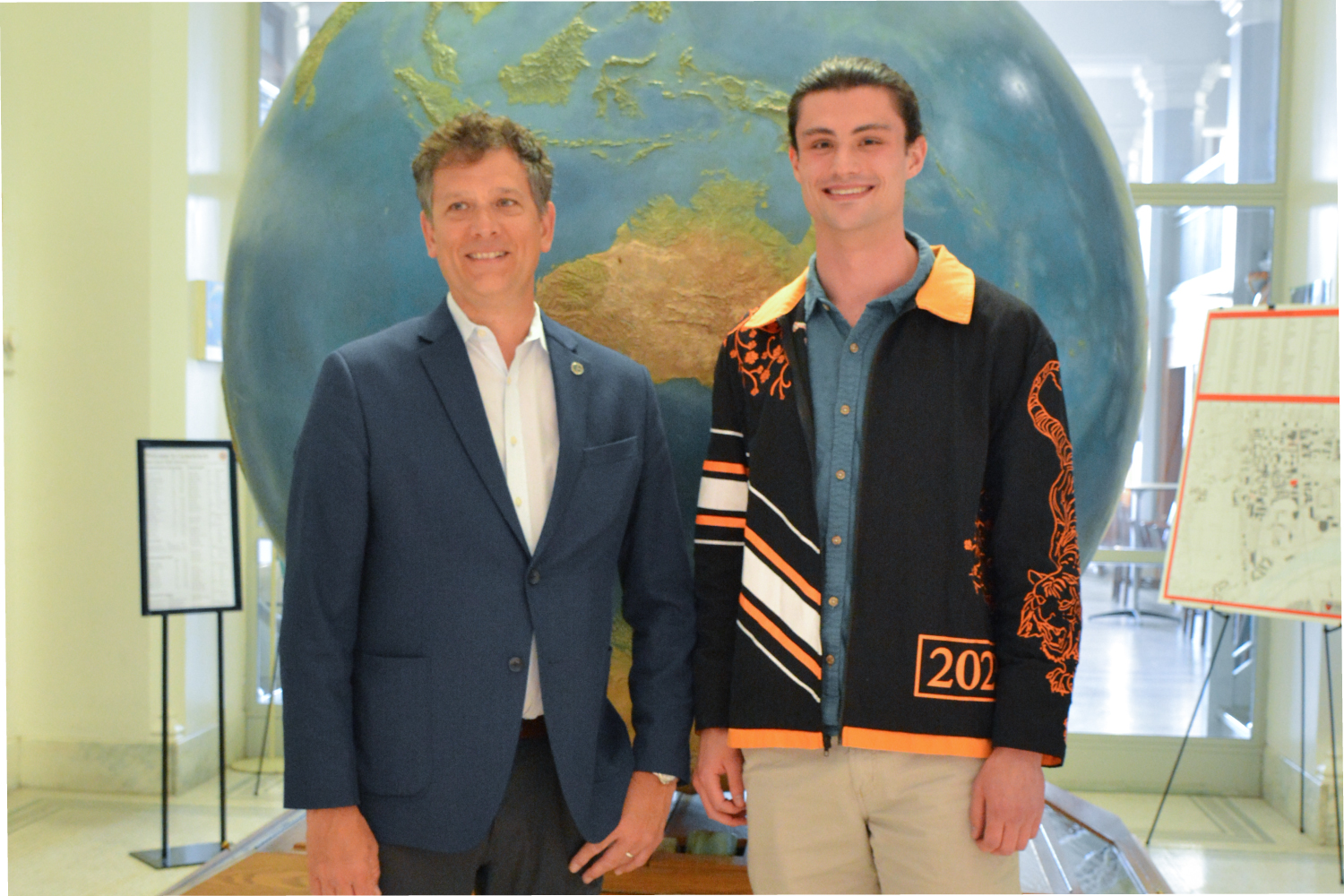

“This work involved running high resolution climate models, analyzing the output, and then building a theoretical framework from which to interpret it. This was a broad and ambitious thesis and I am very hopeful that Ben will keep working with us to get this published because it has turned heads in whatever context it’s been presented.”
Payton Croskey in African American studies received the Peter W. Stroh ’51 Environmental Senior Thesis Prize for her work on “how political and social struggle and a critical examination of fashion scientists and designers who are materializing their visions of environmentally sustainable and climate responsive garments” explores the relationship between technology, ecology, and society.
Tarnita read comments from Croskey’s adviser, Ruha Benjamin, the Alexander Stewart 1886 Professor of African American studies, who said that “Payton’s thesis is a stellar work of scholarship and praxis.”, blending a capacious engagement with thinkers who take imagination seriously as a site of political and social struggle and a critical examination of fashion scientists and designers who are materializing their visions of environmentally sustainable and climate responsive garments.
In addition to examining how fashion designers “are materializing their visions of environmentally sustainable and climate responsive garments”, Croskey also produced and exhibited her own experimental fashion designs. “The actual garments are stunning: mixing repurposed textiles drawn directly from Black cultural practices like hair braiding and quilting, animated by computer code and electricity, opening and closing to shield the wearer from a hostile gaze,” said Benjamin.
Emilio Cano Renteria in civil and environmental engineering received the T. A. Barron Environmental Leadership Prize for his exceptional dedication to the environment, not just in his scholarship and research but also in the way that he engaged with and inspired environmental scholarship within the Princeton community and beyond.
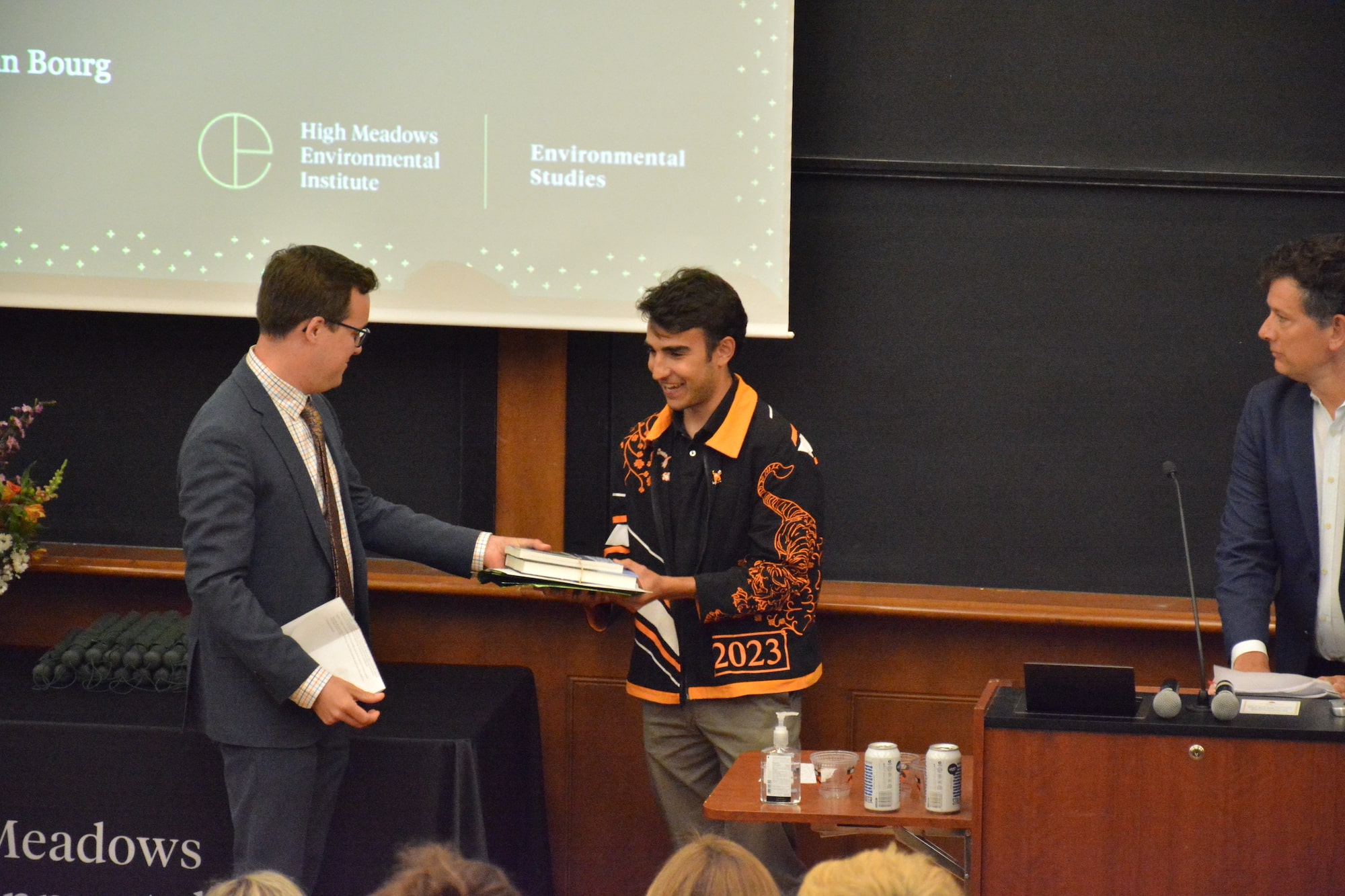

“Beyond his stellar academic achievement and research performance, Emilio also stepped up as a student leader and as an ambassador for the university, for the civil and environmental engineering department and for environmental research in general,” said Jesse Jenkins, assistant professor of mechanical and aerospace engineering and the Andlinger Center for Energy and the Environment, who co-advised Cano Renteria alongside Denise Mauzerall, the William S. Tod professor of civil and environmental engineering and public and international affairs.
While at Princeton, Emilio made significant contributions to campus life, including serving as a peer academic adviser, leader of the Latinx Affinity Group for Tiger Inn, president of club soccer, and as an Orange Key tour guide for which he received the 2023 Spirit of Princeton Award.
“Not surprisingly, a significant amount of Emilio’s leadership activities focused on environmental issues,” said Jenkins.
“In 2020 when Hurricane Iota devastated the islands of San Andres and Providencia in his home country of Colombia, Emilio responded within days by organizing a mass social media campaign to raise awareness about the disaster and raised over $1,000 in donations for restoration projects, which he personally delivered directly to community leaders.”
“While interning for Appian Corporation in Washington DC, Emilio joined an affinity group for environmentally minded employees and participated in a range of activities including energy saving efforts, and efforts to clean up trash along the Potomac and Anacostia rivers.”
“Finally, Emilio served twice as a teaching assistant for FRS 161, a freshman seminar course aimed at introducing students to quantitative environmental science research, with hope of inspiring incoming students to dedicate their careers to environmental work during their studies. Professor of geosciences, Adam Maloof who taught FRS 161 noted Emilio is one of the best TA’s we’ve ever had: his infectious personality and curiosity about our planet inspired a new cadre of students to pursue environmental research.”
Cano Renteria also received the James Hayes-Edgar Palmer Prize in Engineering from the School of Engineering and Applied Science.
HMEI Class Day Awards and Prizes
T. A. Barron Environmental Leadership Prize
The T. A. Barron Prize for Environmental Leadership honors a member of the senior class who has distinguished themself by showing exceptional dedication to environmental concerns in their classes and independent academic work, as well as by leading and encouraging activities among fellow students and community members.


Thesis title: “Evaluating Advanced Nuclear Fission Technologies for Future Decarbonized Power Grids”
Thesis advisers: Jesse Jenkins, Assistant Professor of Mechanical and Aerospace Engineering and the Andlinger Center for Energy and the Environment; and Denise Mauzerall, William S. Tod Professor of Civil and Environmental Engineering and Public and International Affairs, School of Public and International Affairs.
Peter W. Stroh ’51 Environmental Thesis Prize
The Peter W. Stroh ’51 Environmental Senior Thesis Prize is awarded to a member of the senior class who has been determined to have written the best thesis on an environmental topic.


Thesis title: “Effect of the Plant Physiological Response to CO2 on Tropical Precipitation and the ITCZ”
Thesis adviser: Gabriel Vecchi, Professor of Geosciences and the High Meadows Environmental Institute; Director, The High Meadows Environmental Institute; and Deputy Directory, Cooperative Institute for Modeling the Earth System


Thesis title: “Fashioning New Worlds: Weaving Alternative Futures through Fashion Technology and Black Ingenuity”
Thesis adviser: Ruha Benjamin, the Alexander Stewart 1886 Professor of African American studies
Environmental Studies Senior Thesis Prize
The Environmental Studies Senior Thesis Prize recognizes a senior in the Certificate Program in Environmental Studies who has written an outstanding thesis in the broad area of environmental studies.


Thesis title: “Building Equitable Outcomes, BRIC by BRIC: Investigating Barriers to Coastal Resilience Funding Faced by Disadvantaged Communities”
Thesis adviser: Michael Oppenheimer, Albert G. Milbank Professor of Geosciences and International Affairs and the High Meadows Environmental Institute


Thesis title: “The Impact of the El Niño-Southern Oscillation on U.S. and European Renewable Energy Stock Markets”
Thesis adviser: Lin Peng, Visiting Research Scholar, Bendheim Center for Finance and the Krell Chair Professor of Finance at Baruch College’s Zicklin School of Business, the City University of New York.
Environmental Studies Book Prizes
The Environmental Studies Book Prizes recognize students in different categories for outstanding senior thesis research and the ability to communicate the results and significance of their work. The awards are presented in the areas of Environmental Engineering and Applied Sciences, Environmental Humanities, Environmental Natural Sciences, Environmental Performing and Visual Arts, and Environmental Social Sciences. Candidates are interviewed by HMEI faculty and members of the program’s executive committee, who then select the recipients.
ENGINEERING AND APPLIED SCIENCE


Thesis title: Using Field-Informed Hydrologic Modeling to Understand Species-Specific Plant Water Stress under Differing Climate Scenarios
Thesis adviser: Reed Maxwell, William and Edna Macaleer Professor of Engineering and Applied Science, Professor of Civil and Environmental Engineering and the High Meadows Environmental Institute
NATURAL SCIENCES
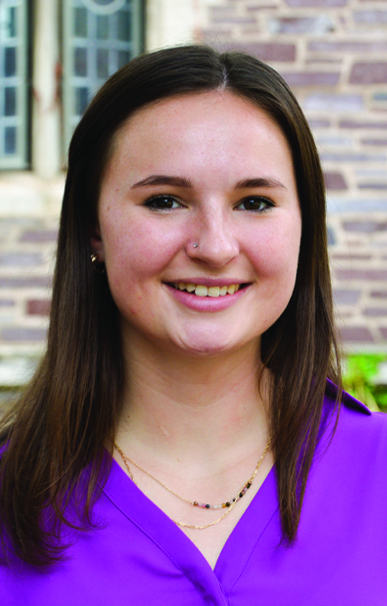

Thesis title: Shedding light on influenza: viral kinetics, transmission dynamics, and antibody titers of seasonal influenza in two South African community cohorts (PHIRST), 2016-2018
Thesis adviser: Bryan Grenfell, the Kathryn Briger and Sarah Fenton Professor of Ecology and Evolutionary Biology and Public Affairs
HUMANITIES


Thesis title: Animal Exploitation and the Capitalist Growth Drive: Towards an Ecosocialist Philosophy
Thesis adviser: Anna Stilz, Laurance S. Rockefeller Professor of Politics and the University Center for Human Values; Director of the Program in Values and Public Life
PERFORMING AND VISUAL ARTS
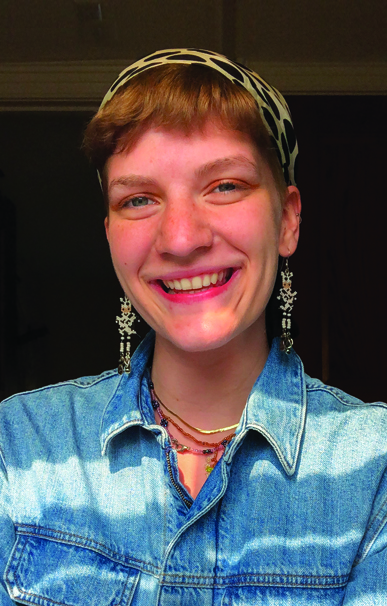

Thesis title: Orange and its rind; On Naming, Trans Becomings, and Holes
Thesis advisers: Brian Herrera, Associate Professor of Theater in the Lewis Center for the Arts and Allison Carruth, Professor of American Studies and the High Meadows Environmental Institute
SOCIAL SCIENCES


Thesis title: Zoning In and Out: Land Use Policies and Environmental Justice in Chicago and Houston
Thesis adviser: Nicky Sheats, Lecturer of Public and International Affairs, School of Public and International Affairs
Henry Horn Prize
Established in 2021, the Henry Horn Prize recognizes graduating senior(s) in the Certificate Program in Environmental Studies who has produced the best video presentation of their independent research for a broad audience. The prize honors the late Henry Horn, professor of ecology and evolutionary biology, emeritus, and founding director of the Program in Environmental Studies.
FIRST PLACE
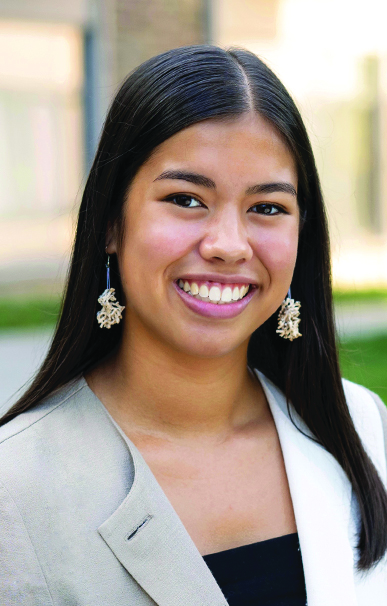

Thesis title: “The Caged Bird Sings of Freedom: Using Social Norm Psychology to Counter Wild Songbird Trade in Viet Nam”
Thesis adviser: Elizabeth Levy Paluck, Professor of Psychology and Public Affairs; Deputy Director, Kahneman-Treisman Center for Behavioral Science & Public Policy
HONORABLE MENTION


Thesis title: “A Minimally Invasive, On-Site Identification Method for Lead-Lined Water Service Lines: A Case Study From Trenton, New Jersey”
Thesis adviser: John Higgins, Associate Professor of Geosciences




